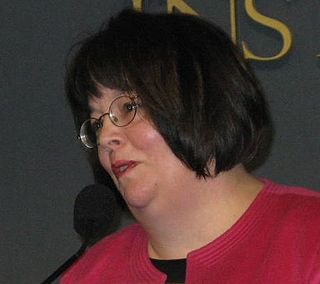A Quote by Kory Stamper
With "marriage," the word gets applied to same-sex marriages by proponents and opponents alike. That means the word itself is changing, and we reflect this change. But because of the idea that the dictionary is the objective voice of authority over culture and knowledge, it reads like approval. It's not a helpful way of looking at lexicography.
Related Quotes
The first question for me is: Are same-sex unions ‘marriages’? I’m against discrimination, I’m against hatred, I’m in favor of marriage equality, but I don’t think same-sex marriage is marriage. Therefore I think it is wrong for the government to insist, through the use of law, that we all believe that same-sex unions are marriages.
And this has been man's stupidity - a very ancient one: whenever he gets into difficulty, he changes the word. Change the word marriage into soul mates, but don't change yourself. And you are the problem, not the word; any word will do. A rose is a rose is a rose...you can call it by any name. You are asking to change the concept, you are not asking to change yourself.
You are asking, 'Is the concept of soul mates more useful than marriage?' Concepts don't matter. What matters is your understanding. You can change the word marriage to the word soul mates, but you are the same. You will make the same hell out of soul mates as you have been making out of marriage - nothing has changed, only the word, the label. Don't believe in labels too much.
New Rule: Gay marriage won't lead to dog marriage. It is not a slippery slope to rampant inter-species coupling. When women got the right to vote, it didn't lead to hamsters voting. No court has extended the equal protection clause to salmon. And for the record, all marriages are "same sex" marriages. You get married, and every night, it's the same sex.
Whenever we remember a series of events, we remember them different. We are constantly changing. It's a flaw, but on the other hand, when we say a word, the meaning is not what you put into it. Rather, the meaning of the word is all of the past usages of that word. Like this cloud that makes up the meaning of the word. It's your subject if you write. For instance what you put in that word and what you assume it means, even its flaw. It has a general agreement.
God's Word will never pass away, but looking back to the Old Testament and since the time of Christ, with tears we must say that because of lack of fortitude and faithfulness on the part of God's people, God's Word has many times been allowed to be bent, to conform to the surrounding, passing, changing culture of that moment rather than to stand as the inerrant Word of God judging the form of the world spirit and the surrounding culture of that moment. In the name of the Lord Jesus Christ, may our children and grandchildren not say that such can be said about us.
The fact that what we believe about marriage - that it should be between a man and a woman - and that we're pro-life, somehow that becomes radical? Why is that? It's because our culture has changed. But the truth is, culture may change, people change, but the Word of God never changes, and that's what we rest our belief system on.
Sometimes the most difficult thing you can do as an editor is not make a single note - the idea that everything and everyone needs editing is, in reality, a fiction. I've gotten pieces where I thought, Well, I could do this or that, or change this word, but in the end, I leave it. Changing something is not necessarily equivalent to making the piece more true to itself, which is the point of editing: it's just changing it because you feel you can or should or must.































